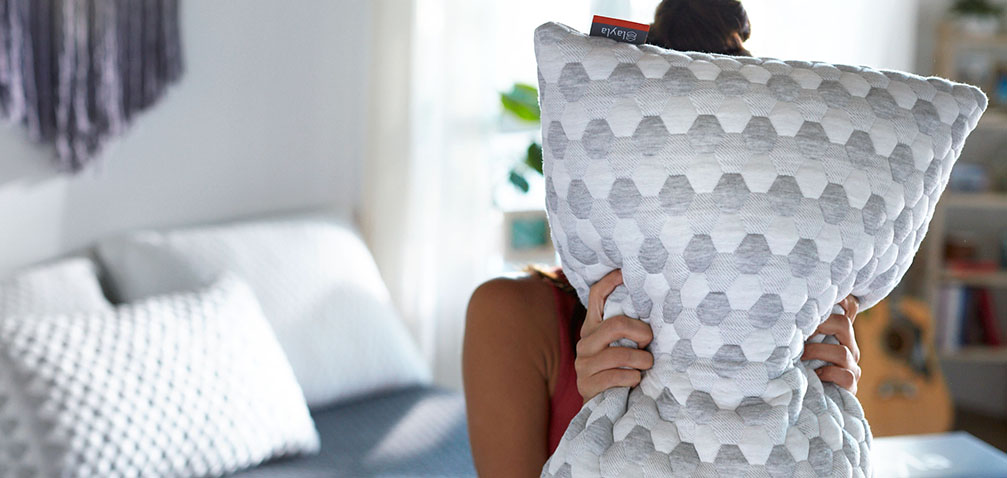While your circadian rhythm is important to understand, there’s something else you should know about, called your chronotype, which can tell you whether you’re naturally an early riser or prefer to stay up late. Knowing your chronotype can help you determine the best time to sleep and wake up to help you feel your best the next day. Right now, you might be wondering, “What is my chronotype, and why is it important?” This article will discuss the importance of your sleep chronotype and why it matters.
- What Is a Sleep Chronotype?
- What Are the Four Chronotypes?
- What Is My Sleep Chronotype?
- Why Is My Chronotype Important?
- How Can I Use My Chronotype to Get Better Sleep?
- Wrapping Up: What Is My Chronotype?
What Is a Sleep Chronotype?
Everyone has a sleep time preference. Some people like staying up late, while others prefer to wake up early. Your sleeping time preference, also known as your chronotype, is linked to your genetics and internal biological clock. While there are several chronotypes, most of us are considered night owls or early birds. However, researchers believe the different chronotypes are related to our survival techniques when we were hunter-gatherers. It’s possible that our ancestors woke up early or stayed up later as a survival technique, taking turns so someone would always be on the watch for predators.
In other terms, your chronotype is related to your circadian rhythm, which controls your sleep-wake cycle and releases certain hormones, such as melatonin, to help your body wind down at night or wake up in the morning. However, many people know that their sleep rhythms can be altered by going to sleep and waking up at the same time every day. For example, someone who is naturally an early bird might get a night shift job and have to change their schedule, even though they’ll likely feel tired at first and more awake later as their natural wake cycle starts. Still, you can’t fight your natural inclination to sleep and wake at certain times.
Of course, your chronotype doesn’t affect how much sleep you need or your ability to enter deep sleep. However, it can affect your sleep cycle, especially if you’re a night owl who has to wake up early. How much sleep do you need? Most healthy adults need at least seven to nine hours of sleep a night, but their chronotypes should not affect how much sleep they get. However, it can affect their overall sleep quality.
What Are the Four Chronotypes?
There are four sleep chronotypes that can help you improve your sleep quality. However, before you can use this information to get better sleep, you must determine which chronotype you identify with. Wondering, “what is my chronotype?” Here are the characteristics of the four distinct sleep chronotypes:
Lion Chronotype
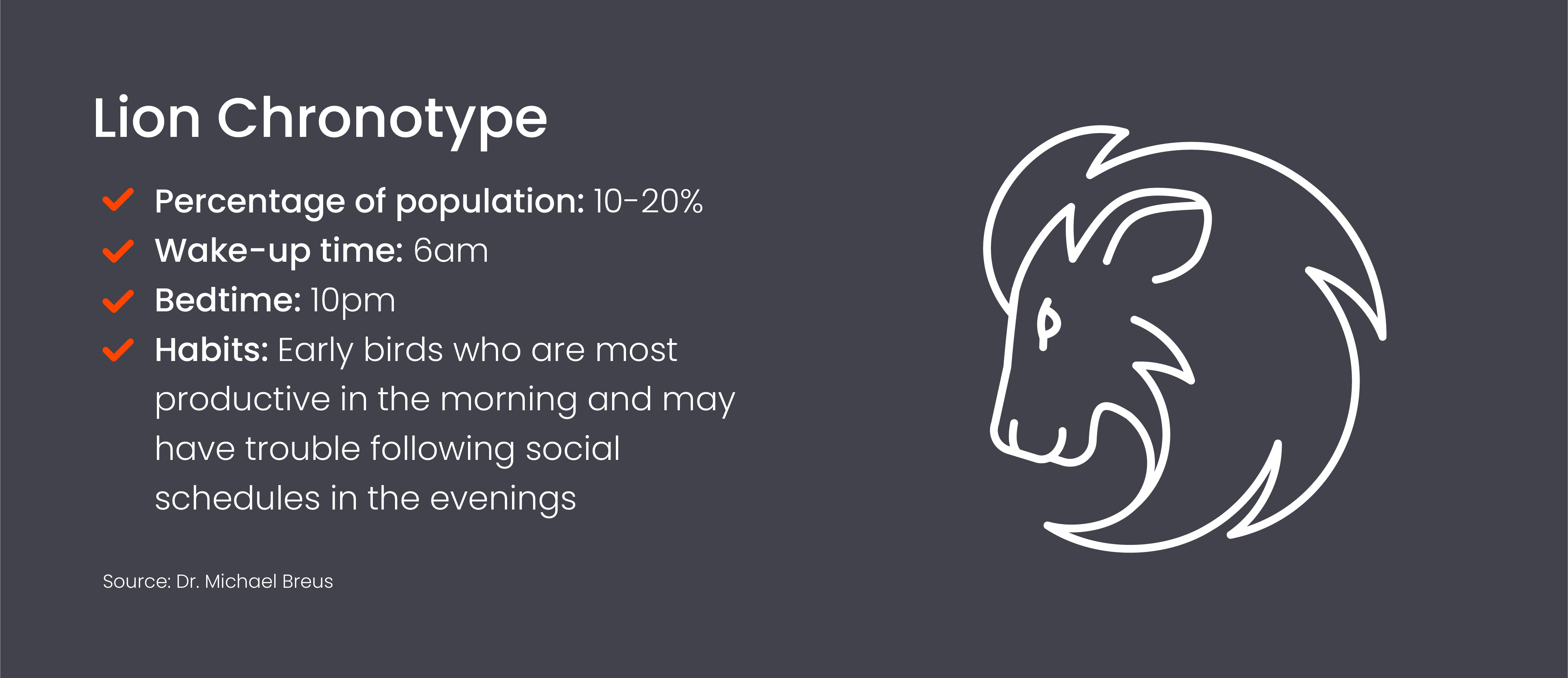
The lion chronotype is one who likes to wake up early, most commonly referred to as the early bird. Individuals who identify with the lion chronotype feel most productive in the early morning hours and may feel tired later in the day. They typically prefer to wake up around 6 am and go to bed around 10 pm. Unfortunately, these individuals may feel too tired in the evening hours and become less productive as it gets later in the day.
Bear Chronotype
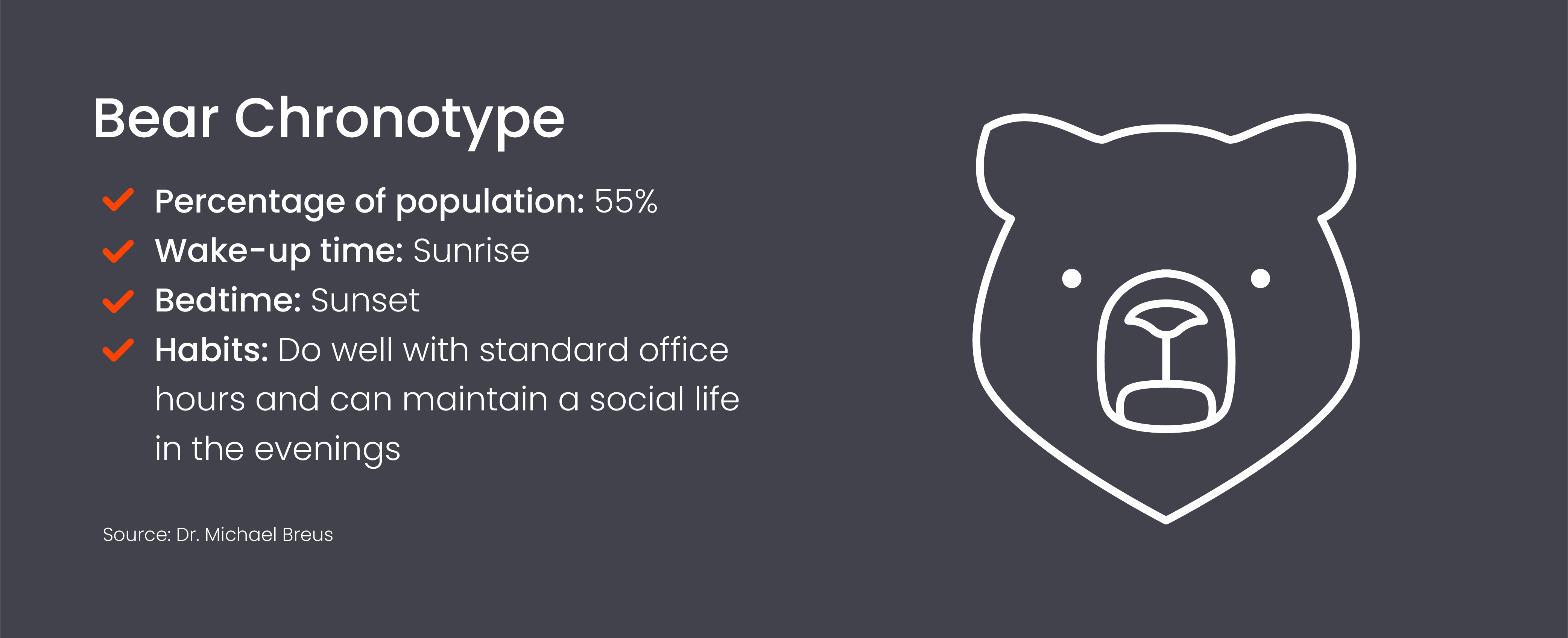
Most people are the bear chronotype. This person wakes up around sunrise and sleeps around sunset, with peak productivity in the late morning. Since their energy levels rise and fall with the sun, these individuals are most likely to succeed at 9 to 5 jobs.
Wolf Chronotype
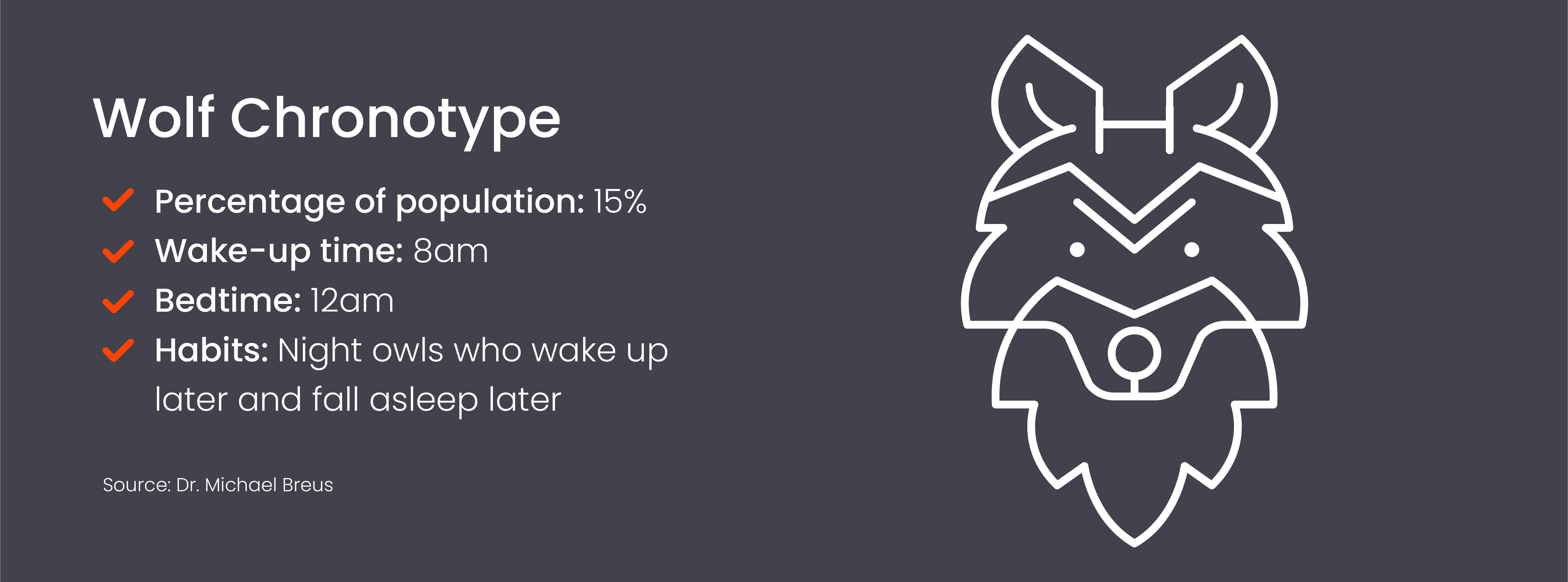
The wolf chronotype is someone who is considered a night owl. They typically wake up around 8 am and sleep around midnight, with peak productivity in the midday and evening hours. These individuals ultimately stay up later and sleep later than everyone else.
Dolphin Chronotype
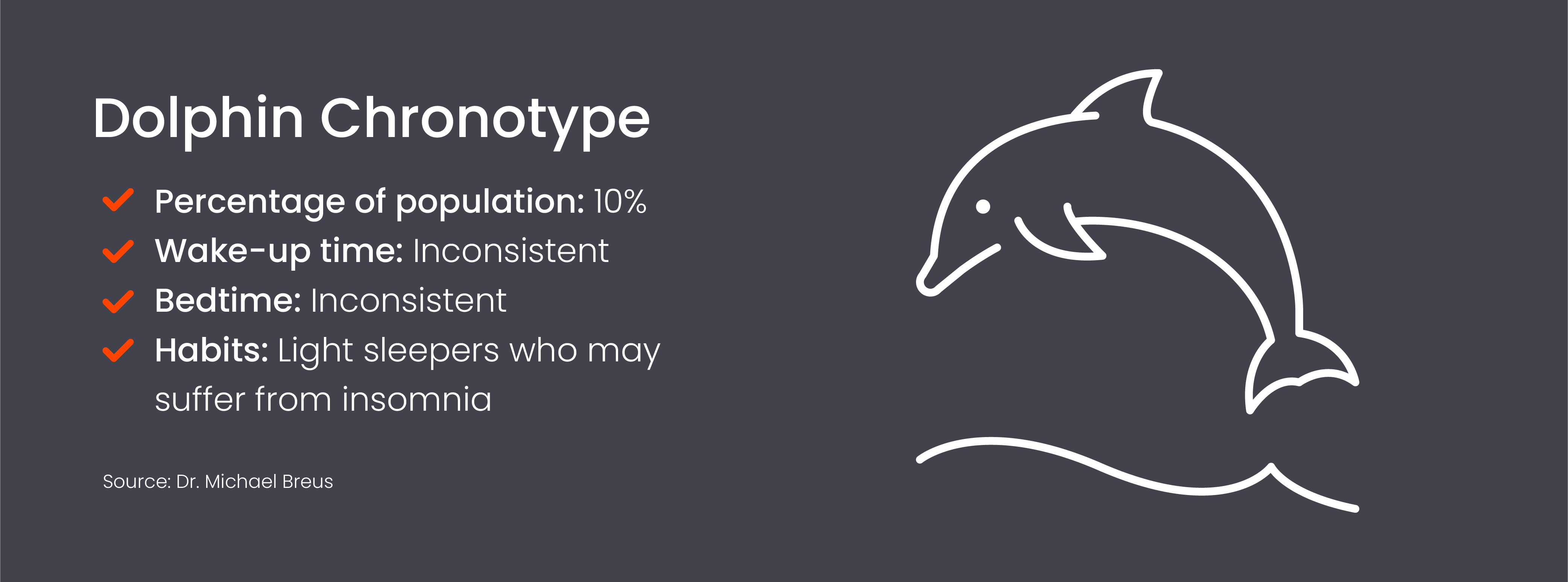
The dolphin chronotype is the rarest. Individuals with this chronotype have irregular wake and sleep times with peak productivity in the late morning, especially if they’re just waking up around that time. They’re often light sleepers and suffer from insomnia.
What Is My Sleep Chronotype?
Now that you understand the four sleep chronotypes, you can determine which one you are. To figure out your chronotype, consider when you’d prefer to wake up and go to sleep. It’s important not to think about the times you actually do wake up and go to sleep because these might not be ideal for you. Therefore, if you wake up at 7 to work at 9, consider when you’d like to wake up. Once you have that information, you can compare it to the chronotypes we just discussed to determine which one you’re most like.
Why Is My Chronotype Important?
Believe it or not, your chronotype impacts more than just your sleep schedule; it can affect your personality. For example, studies have found that individuals who are morning people tend to be more agreeable than those who are night owls. Meanwhile, individuals with the wolf chronotype tend to be more neurotic. However, everyone is unique.
That being said, morning people tend to perform better at regular 9 to 5 jobs and school because their chronotype aligns with those hours. However, we can’t confirm whether these personality traits are due to chronotype or other factors.
Unfortunately, there’s nothing you can do about your work schedule, so your chronotype might not align with important aspects of your daily life. However, adjusting your sleep schedule may help improve sleep to help you feel more alert while you’re at work or school. Still, most people can’t change their chronotypes even if they try to go to bed earlier or later every night.
How Can I Use My Chronotype to Get Better Sleep?
You can’t change your chronotype, but you can arm yourself with the knowledge about your chronotype to help you make better choices. By knowing your chronotype, you can use your internal clock to improve your sleep quality and set ideal bed and wake times. For example, if you’re a lion, you know that you’re most productive during the early morning hours, so you can schedule the most daunting or intensive work, including exercise, for those times. Meanwhile, if you’re a wolf, you may not be in the office when you’re most productive, so you might consider taking some of your work home to adjust for your less productive hours in the day.
Meanwhile, while you can adjust your sleep schedule, you can’t change your chronotype. Therefore, if you’re a wolf and prefer to go to bed around midnight and wake up around 8, you may have to make other lifestyle changes to ensure you get the best sleep possible. This might mean moving closer to the office to ensure you can sleep until 8 and still make it to work on time or scheduling important work during the evening hours to prevent sleep disturbances later on.
No matter what type of chronotype you are, the best thing you can do is improve your sleep hygiene and ensure you’re getting enough sleep every night. While you might still feel tired after 8 hours, life sometimes forces us to defy our chronotypes. However, you can ensure your circadian rhythm is working properly by going to bed and waking up at the same time every day, even on weekends. This will ensure your body releases the hormones that help you feel alert during the day and tired at night at the right times throughout the day.
Wrapping Up: What Is My Chronotype?
We don’t have to tell you about the importance of sleep. However, several factors can affect your sleep quality, including your chronotype. Luckily, you can use the information you’ve learned about your chronotype to improve your sleep and productivity the following day. Unfortunately, you can’t change your chronotype no matter how much you try, so if you’re a night owl who prefers to stay up late and wake up around 8 am, you might feel tired for the first few hours of work.
However, understanding your chronotype can help you make certain lifestyle changes that improve your sleep and overall health. For example, knowing when you’re most productive can tell you when to start working on the most extensive work, improving your work performance. Meanwhile, your chronotype can tell you what to eat and when to exercise, allowing you to start using this information to make lifestyle changes that can enhance your quality of life and overall health.
Whether you’re a lion, bear, wolf, or dolphin, the best thing you can do for yourself is to ensure you get quality sleep every night. One way to ensure you get enough quality sleep is by investing in a memory foam mattress. Layla’s Memory Foam Mattresses are designed to keep you cool and comfortable all night long with copper-infused memory foam and a breathable mattress cover. Try Layla’s 30-night sleep trial to improve your sleep quality, no matter your chronotype.



